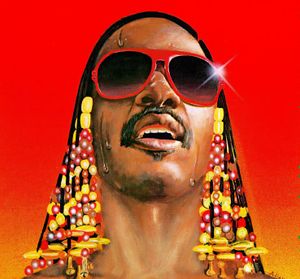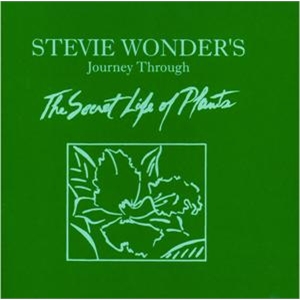Stevie Wonder
Stevland Wonderful-Hardaway (born May 13, 1950 as Little Stevie Wonder), known by his stage name Stevie Wonder, is a freak of nature of the most fantastic variety: a man who, though crippled from irreparable blackness, found remarkable success in the music industry.
Little life
Stevie Wonder was born Little Stevie Wonder in 1950, to Caucasian parents Tony Wonderful and Lula Mae Hardaway. Owing to his being born six weeks premature, the blood vessels in the dermis layer of his skin did not have ample time to fully develop. They quickly shattered, sending waves of color-altering melatonin throughout the bloodstream, transforming Little Stevie into a fully black child. This came as a small surprise to Judkins and Hardaway, whose mailman was also black; this misunderstanding created some strife in Little Stevie's childhood.
His parents tried to make the best of the bad situation by propelling Little Stevie into the field of comedy at an early age, in hopes that he become the next Bill Cosby or Redd Foxx. While his standup act wasn't a smashing success, as the eighteen-month-old could barely stand (let alone perform comedy), Little Stevie accidentally discovered his virtuosity for the piano during a Jerry Lewis-style Ray Charles impression.
Career
1962–71: Humble beginnings

Motown head Berry Gordy, hearing of the performance, signed the black boy as a novelty act and forced him to ape the style of Ray Charles, that other successful black pianist. Gordy kept Little Stevie on a strict regimen to get his act juuust right. By the age of four, Little Stevie was already overcoming his second heroin addiction and third wife, and though he was not physically capable of siring twelve illegitimate children as Charles had, his parents picked up the slack where Little Stevie dropped off. Wonder threw on a pair of sunglasses and the airtight mimic was complete; at the age of six, Wonder released his first album, A Tribute to Uncle Ray From Little Stevie Wonder: The Next Ray Charles.
Consumers thought the association was being hammered in a bit too hard, and sales subsequently suffered. Each party involved pointed fingers in a Mexican standoff of blame: Little Stevie, nearing the age of creative consciousness, wanted to broaden his artistic palette; his parents blamed "the system" for marginalizing the kid due to his crippling racial problem; lasty, Berry, ever the perfectionist, blamed Little Stevie for not being black enough. He attempted to rectify this with a blowtorch and some permanent marker, but a compromise was reached over a darker shade of sunglasses.
1972–78: Blackened eyes, golden years
The deeper darkness around Stevie's eyeball area begat more than hilarious slapstick antics involving tripped-over ottomans, as the musician began songwriting with greater clarity than ever before. He released album after album of envelope-pushing funky music, incorporating conscious themes into dance-ready soul tunes, utilizing new musical technology in ways unseen since Milton Babbitt's sultry affair with synthesizers.
Many credit his creative surge to his darker sunglasses. By eliminating his pesky blanched sclera from the eyeball equation, the wonderglasses granted Stevie an incorruptible pair of ebony eyes to match his darker shade of skin, releasing the ultimate essence of pure black soul in the process. The decision to embrace his negroid ailment paid dividends, and his career entered into its classic "Void Era", so-called for its literally darker tone and abyssal lack of abysmal output, beginning with 1972's Talkin' Books.
Though an abstract discourse on the importance of libraries in America for eight out of nine tracks, Talkin' Books included future radio staple "Superstition", catapulting the album to multiplatinum status. He followed it up with the even more successful Innertubin', an introspective album inspired by a near-fatal manatee collision Wonder experienced while floating down the Missouri River. Though the album reached higher ground, Wonder did not climax until 1976's Songs in the Key of Life. The ambitious double album proved to many racist naysayers that Wonder, despite being black, was no joke.[1]
1979: The Secret Life of Plants
There was, however, a cruel joke brewing in the musical gossipsphere. The public began to credit the sunglasses, not Stevie, for his prodigious gifts, and paranoia subsequently mounted. In fear that he might lose his talents the instant the shades slipped, Wonder refused to remove his glasses for even a second, even stapling the ends to his temples while he slept. Unfortunately, these protective measures backfired when a tawdry rumor began circulating: because he was now never seen without the sunglasses, people began to suspect that Stevie was blind.[2]
That was the last straw. To counter these rumors, and prove to himself that he was the master of his domain, Wonder set to work on his biggest album yet: Stevie Wonder's Journey Through "The Secret Life of Plants". Just to show that he wasn't fucking around, he also orchestrated a companion film for the album to score, both created without any aid from the sunglasses. "Those glasses were just a parasite on me, a crutch," Wonder said in a Rolling Stone interview. "I can be as black as I want to be, and still sell just as well without them. This upcoming double album on trees and plants will surely prove that. After all, who doesn't love the environment?"
Most of the record-buying public, it would seem. Secret Life of Plants bombed horribly after the album's big secrets leaked a month before the release date.[3] Flustered by the leak, suspecting a curse cast by the neglected sunglasses, Wonder's label heavily cut promotion and shelved the film entirely.[4] The gambit to reclaim the reins to his career was a massive failure. Scooping the dusty sunglasses out of the studio trashcan, Wonder, gazing into the abyss, prayed for the sight necessary to revive his career one more time.[5]
Since 1980
Wonder struggled for some time, first attempting to recoup his losses via playing bar mitzvahs and hosting an ill-fated game show, before the moment of clarity revealed itself before his perfectly functioning eyes. At nearly forty years old, Wonder was no spring chicken. His fingers started to wrinkle. His legs began to ash. Black had begun to crack. Instead of desperately trying to preserve his youth with forced sexuality and a series of poorly advised groupie corrals, a la The Rolling Stones, Wonder had embraced his advancing age by embracing the musical maturity that came along with it.
Luckily for Wonder, the smooth inoffensive quiet storm of adult contemporary R&B was a commercial juggernaut in the soft-focus 1980s. Wonder's post-Golden era releases recouped the losses of Plants quickly, tapping into the vast markets of saxophone aficionados, corny uncles, and the coveted "Menopause Belt". The evolution of Wonder's sound and shift in target audience opened the mantle of Black King of Soul to younger artists such as Prince and Michael Jackson, though the latter would have trouble maintaining that title for several reasons.
Nowadays Wonder has gone full cheesy. He plays exclusively at weddings, in white rhinestone-encrusted tuxedos, many times giving half-hour toasts to couples he knows little to nothing about. Habitual wedding singing transformed into an addictive habit; he has even started crashing weddings to which he wasn't invited, each time launching into 45-minute-long improvisations of "Isn't She Lovely". As a result, wedding security in the Los Angeles area has doubled in recent years, in hopes of quelling Wonder's dirty, almost involuntary habit.
Legacy
Wonder's critical relevance never recovered from Plants, but his Golden Era releases still resonate around the globe. Thanks to Wonder's breakthroughs as a black artist in the '70s, he has been hailed by many as the "Jackie Robinson of Soul". Critical reevaluation, however, has modified this moniker to the "Hank Aaron of Soul", since his precursor Ray Charles was the technical Jackie Robinson of Soul.[6] Wonder's string of popularity in the '70s made it possible for dozens of African-American musicians to succeed in the music industry since then, with at least nine of them getting decent record contracts.
All told, Wonder has 22 Grammys and more than fifty charting singles, with ten hitting number one. Not a bad track record for a man who was told he would never be able to play an instrument again.[7]
Footnotes
- ↑ No joke. Nope. Not even one.
- ↑ or worse, friends with Whoopi Goldberg
- ↑ Some secrets: When flowers bend, they're just trying to dance; rubbing tree bark on your thighs prevents warts; hemlock tastes great despite the deadly poison; dandelions are evil.
- ↑ This very creepy romp through the sunflowers still exists as archival footage.
- ↑ his sweet, metaphorical sight
- ↑ which would make Albert King the "Mookie Wilson of Soul"
- ↑ You know ... because he's black. Racists.


